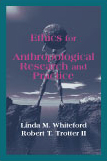“Essential reading for understanding the complex and potentially damaging nature of even the most ‘well-intended’ research.” — Mary Lorena Kenny, Eastern Connecticut State University
“The best quick overview available by far.” — Leslie E. Sponsel, University of Hawaii, Manoa
“This book is very much needed in teaching ethnography today.” — Denise Nuttall, Ithaca College
“I recommend it as an uniquely valuable text for undergraduate and graduate classes in research methods as well as a resource for Institutional Review Boards.” — Ann McElroy, University at Buffalo
“This is an extraordinarily informative and insightful book that provides a critical dimension to courses on research design and/or methods. The ‘ethical dilemma’ case studies are excellent vehicles for discussion and the authors equip the reader not merely with instructive examples but with an informed capacity to apply key principles to ever-new and ethically challenging situations.” — Paul V. Kroskrity, University of California, Los Angeles

130 pages, $22.95 list
1-57766-535-X
978-1-57766-535-9
© 2008
paperback
eBook availability
Ethics for Anthropological Research and Practice
Whiteford and Trotter provide current and prospective researchers and practitioners with a solid foundation of essential ethical concepts and issues, including respect for persons, beneficence, and justice. They take into account national and international discussions and practice of ethics. The authors also explore ethical problems common among anthropologists.
Ethical challenges often arise from the unanticipated consequences of a research design, from conflicts among stakeholders or from the clash of two positive ethical principles—when adherence to one of the principles may violate another. Functioning as both a capstone and a learning tool, the last chapter presents a real-life ethical dilemma and introduces readers to a detailed problem-solving guide.
End-of-chapter questions and five ethical dilemma cases prompt analysis and discussion. The latest printing incorporates excerpts from the 2012 AAA Code of Ethics.
Ethical challenges often arise from the unanticipated consequences of a research design, from conflicts among stakeholders or from the clash of two positive ethical principles—when adherence to one of the principles may violate another. Functioning as both a capstone and a learning tool, the last chapter presents a real-life ethical dilemma and introduces readers to a detailed problem-solving guide.
End-of-chapter questions and five ethical dilemma cases prompt analysis and discussion. The latest printing incorporates excerpts from the 2012 AAA Code of Ethics.
Reactions
1. The Complex Nature of Ethics
Anthropology and Ethical Challenges / History of Ethical Principles and Guidelines in Anthropology / Applying Ethical Decision Making to Real-Life Problems / Anthropological Challenges and Culturally Sensitive Ethics
2. Legal Codes and Ethical Guidelines
Ethics Didn't Start with Science / Lest History Repeat Itself / Ethical Guidelines for Research in the United States / American Anthropology and Ethics / Ethical Dilemma: Female Genital Cutting
3. Principles for Ethical Research
The Basic Principles / The Right to Privacy and Other Basic Civil Rights / Ethical Dilemma: Moral Judgment in Alto do Cruzeiro
4. Respect for Persons
Voluntary Participation / Competence to Participate / Confidentiality / Informed Consent / Issues in Crosscultural Ethnographic Research / Ethical Dilemma: Voluntary Participation in Clinical Trials
5. Minimizing Harm and Maximizing Justice
Addressing Harm / Exploring the Actions Required by the Principle of Justice / Crosscultural Issues / Data Access, Control, and Dissemination / Ethical Dilemma: The Bío-Bío Case
6. Vulnerable Populations
The Need for Special Protections / The Community as a Vulnerable Population / Advocacy and Vulnerable Populations
7. Anthropological Ethical Problem-Solving Guide
Steps for Using the Ethical Problem-Solving Guide / Case Study: The Shooting Gallery / Ethical Dilemma: The Tungurahua Volcano
Epilogue
Anthropology and Ethical Challenges / History of Ethical Principles and Guidelines in Anthropology / Applying Ethical Decision Making to Real-Life Problems / Anthropological Challenges and Culturally Sensitive Ethics
2. Legal Codes and Ethical Guidelines
Ethics Didn't Start with Science / Lest History Repeat Itself / Ethical Guidelines for Research in the United States / American Anthropology and Ethics / Ethical Dilemma: Female Genital Cutting
3. Principles for Ethical Research
The Basic Principles / The Right to Privacy and Other Basic Civil Rights / Ethical Dilemma: Moral Judgment in Alto do Cruzeiro
4. Respect for Persons
Voluntary Participation / Competence to Participate / Confidentiality / Informed Consent / Issues in Crosscultural Ethnographic Research / Ethical Dilemma: Voluntary Participation in Clinical Trials
5. Minimizing Harm and Maximizing Justice
Addressing Harm / Exploring the Actions Required by the Principle of Justice / Crosscultural Issues / Data Access, Control, and Dissemination / Ethical Dilemma: The Bío-Bío Case
6. Vulnerable Populations
The Need for Special Protections / The Community as a Vulnerable Population / Advocacy and Vulnerable Populations
7. Anthropological Ethical Problem-Solving Guide
Steps for Using the Ethical Problem-Solving Guide / Case Study: The Shooting Gallery / Ethical Dilemma: The Tungurahua Volcano
Epilogue